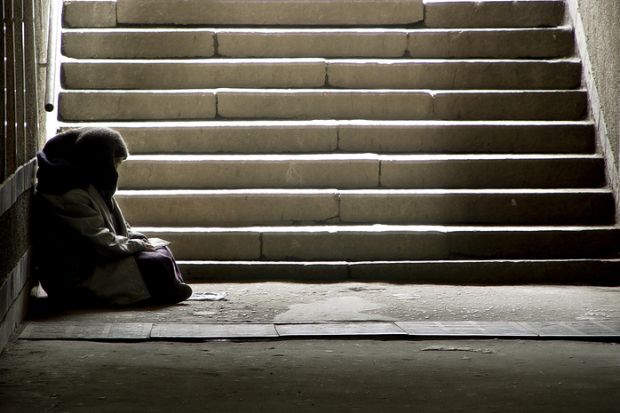UK universities are uniquely placed to make significant interventions to prevent homelessness within both their own student populations and the wider communities they serve, a report has concluded.
As key civic actors and research powerhouses, the Higher Education Policy Institute (Hepi) paper argues, institutions can break the impasse and bring new thinking to how to tackle the stubbornly persistent issue.
The report highlights steps that universities can take, including conducting research across academic disciplines into the effectiveness of efforts to address homelessness; adopting inclusive recruitment practices to open up opportunities for people affected by adversity; and using property and estates to expand access to social housing.
While students are statistically less likely to experience homelessness than their peers who are not in higher education, the report highlights that widening participation efforts have brought into student populations more people whose past experiences place them at a higher risk of homelessness.
Little effort has been made to assess the extent and scale of the problem of homelessness among students, the report says, but several snap surveys and personal testimonies suggest that it may have been significantly under-reported.
It recommends that universities make renewed efforts to monitor students’ housing situations and develop targeted support, particularly in light of the cost-of-living crisis and its potential impact.
The report’s author, former Times education editor Greg Hurst, writes that “there is a powerful case to be made that the goal of ending homelessness could and should engage universities on several levels”.
Noting that university towns and cities tend to have higher rates of homelessness than areas without institutions, he says there is a “strong argument” that they have an “opportunity or even duty” to use their powerful positions in local economies to support initiatives that address the problems.
In the report’s foreword, Mary Stuart, emeritus vice-chancellor of the University of Lincoln, who herself experienced homelessness while pregnant with twins before beginning her academic career, says that for her and her husband, getting an education was their pathway “to move from being vulnerable in society, to contributing to society”.
She adds that although homelessness is a complex issue that has many causes, universities “can provide some parts of the solution for some homeless people” and that working with others to address the challenges should be “part of any university’s mission”.
Register to continue
Why register?
- Registration is free and only takes a moment
- Once registered, you can read 3 articles a month
- Sign up for our newsletter
Subscribe
Or subscribe for unlimited access to:
- Unlimited access to news, views, insights & reviews
- Digital editions
- Digital access to THE’s university and college rankings analysis
Already registered or a current subscriber? Login








